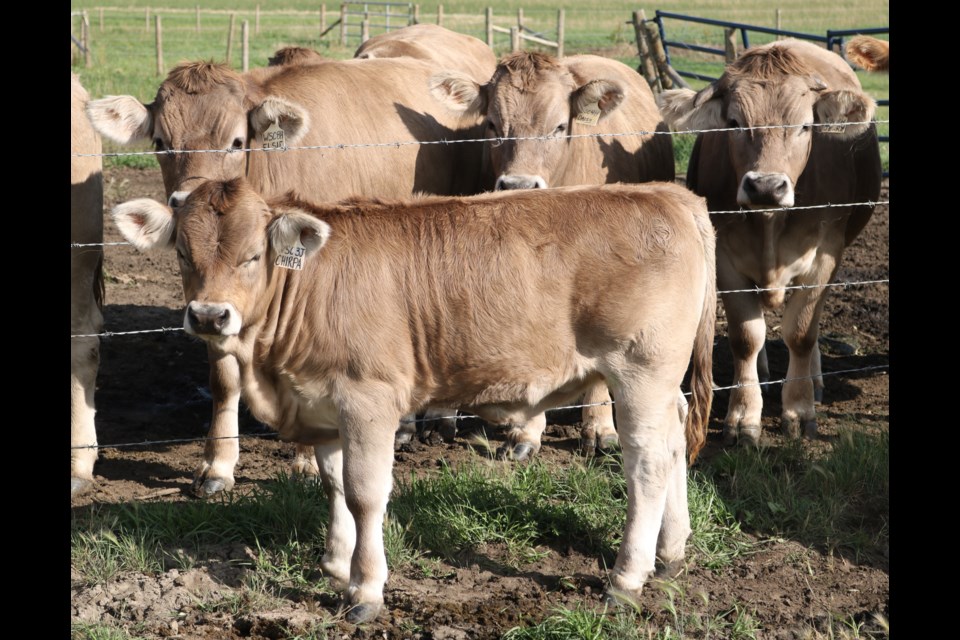The farm, which the couple term ‘boutique’, is operated by Murray and Angela Prokopetz.
Both were born in the area, Angela just a few miles away, and Murray at Burgis, but after high school they headed to Alberta.
“I’m not sure if we were running from or running to something,” said Angela with a smile.
The couple would spend the next 30 years in Alberta, both pursuing what most would deem fine careers, her working with government and he in mechanical engineering, but the rapid pace was getting to them.
“There (Alberta) it’s like working 12-13-14 hours a day, seven days a week,” said Murray.
After their last 18 years in Edmonton “we needed some peace and quiet,” he said.
The couple started thinking “where are we going to go for the next adventure?” said Angela. “. . . We were too young to retire and too old to start working for somebody else.”
The answer was to head home and start a farm.
The quarter section they selected was a canola field back in 2013, and since then the couple has transformed the land, planting hundreds of trees, building a home, adding livestock, and a large garden.
The garden is actually like the element which connected the couple to where they grew up, to where they would return too.
Angela said no matter where they lived in Alberta “a garden was a must.” It was her connection to growing up, milking cows and helping her mother in what she said “was a huge garden.”
Naturally, on their own farm a garden was a natural, but Angela has gone about it just a little differently.
“I try not to grow the same thing you find at a farmer’s market,” she said, adding she focuses on heritage varieties.
“I order seeds from all over Canada,” she said, adding in some cases she looks even farther afield. The garlic she grows now took three years to obtain, and came out of Europe.
The garden is grown to match the general philosophy of the farm which is “let’s feed ourselves the way we want to,” said Angela.
That means taking a largely organic approach – with being fully organic in the plans.
“We try not to use chemical inputs,” she said adding they have said “let’s try to grow the healthiest food we can.”
With what are generally locally unique varieties growing in the garden the Prokopetz’s have something to market that is just a little different, which is how they look to generate an income on limited acres.
They have taken the same approach when it came time to add livestock.
They wanted laying hens, but they didn’t go for the breeds you might normally expect to see.
The list of breeds running free range on the farm reads a bit like a list of rare and endangered chickens: Buckeyes, Wyandottes, Orpingtons, Brahmas, Australorps. They also have a few Barred Plymouth Rocks and Rhode Island Reds, and last year’s new addition were Jersey Giants.
Then there are the goats, which again aren’t the usual breeds for the area, choosing Nigerian Dwarf Goats, which as the name implies are a small breed of dairy goat.
But among the rather varied elements of the farm it is rather clear the cattle herd is the Prokopetz’s pride and joy, and again they are not exactly a breed most would recognize.
In fact, Murray estimates they are the only breeders in Saskatchewan currently registering Braunvieh cattle.
“The German word “Braunvieh” means “Brown Cattle”. Braunvieh enjoy the status as being one of the oldest pure breeds, which originated in the alpine regions of Switzerland,” notes www.canadianbeefbreeds.com “. . . Braunvieh is a medium-sized, dual purpose breed, which excels in maternal traits and docility. They are very hardy, adapting to extreme cold or heat and are known for their longevity. About 40 per cent of the cattle in Switzerland are Braunvieh and, due to their high performance and exceptional tolerance to various climates, they are raised in more than 60 countries, from the Arctic Circle to the tropics, at altitudes varying between sea level and 12,500 feet.”
The couple first saw Braunvieh at a fall fair and quickly fell to like what they saw.
“They looked like giant mice,” recalled Angela, recalling the first time they saw the ‘mousy-coloured’ cattle.
They would eventually approach a noted breeder from Alberta, suggesting they would one day buy some cattle.
“They actually laughed,” recalled Murray with a smile.
But once on their farm they soon ordered some heifers delivered. Murray said the breeders Ian and Verena Peden of Leduc actually remarked, “we never ever thought we’d see the day.”
But, the Alberta breeders have become more than a source of cattle, and are very much mentors to the Prokopetz’s.
“They are so excited for our success,” said Angela.
Certainly there has been a learning curve returning to the farm.
The couple found when it came time to artificially inseminate their cows, no one was around to do it. So Murray enrolled in a course at Olds College and spent a week learning how to do it.
So are exotics pigs or sheep next for the boutique farm?
“I think we have kind of maxed out. We want to keep small. We’re very hands-on with all of our animals,” said Angela.
It’s that hands-on that makes what they have to sell popular. The grass fed Braunvieh beef actually had people from as far away as Prince Albert and Calgary coming to buy.
“This is not a hobby farm, the amount of work we do, the care we take,” said Angela.




